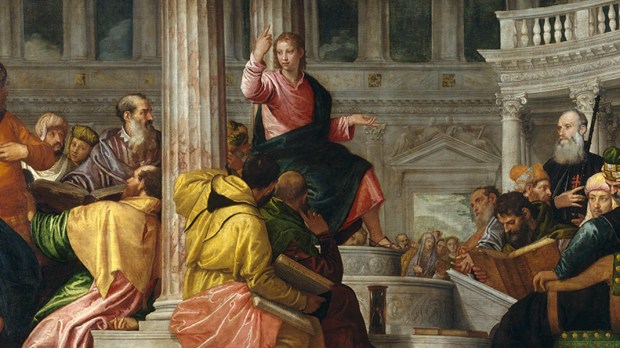The finding of Jesus in the temple is the only event that breaks the silence of the Gospels about the hidden years of Jesus. Here Jesus lets us catch a glimpse of the mystery of his total consecration to a mission that flows from his divine sonship: ‘Did you not know that I must be about my Father’s work?’ (Lk 2:49). ~The Catechism of the Catholic Church
For three days the parents of Jesus searched for him, not knowing where to find him. The fear and loss of Mary and Joseph would return. Two decades later the disciples of Jesus would know the same fear and loss: “They have taken the Lord,” Mary Magdalene says, “and we do not know where to find him!” (John 20:2).
Mary, the Mother of the Lord, would remember this moment. St. Luke tells us, “his mother kept all these things in her heart” (Luke 2:51). Mary is the memory of the Church, as Pope St. John Paul II puts it. Having been filled with the Holy Spirit since the Annunciation, Mary’s memory is not a faint grasping or darkened struggling. Filled with confidence, she passes on a true knowing, a fuller comprehension of the events of Jesus. Her quiet unbroken consideration gently probes what is at stake.
What does this pondering and keeping of memory mean?
Hans Urs Von Balthasar says, “In no way at all does she understand everything completely from the first moment onward but has to work tirelessly in order to understand all these overpowering ideas as well as she may.” The Virgin Mary is not an actor in a divine comedy. She freely gives herself over, time and again, to pondering the divine mysteries. She plies herself; again and again she turns her mind to contemplate the designs of the Father.
After three days they found him in the temple, sitting in the midst of the teachers, listening to them and asking them questions, and all who heard him were astounded at his understanding and his answers. When his parents saw him, they were astonished, and his mother said to him, “Son, why have you done this to us? Your father and I have been looking for you with great anxiety.” And he said to them, “Why were you looking for me? Did you not know that I must be in my Father’s house?” But they did not understand what he said to them. He went down with them and came to Nazareth, and was obedient to them; and his mother kept all these things in her heart (Luke 2:46-51).
In fact, in this mystery of the Rosary, she reveals to us the disposition for praying the Rosary. As a believer, having responded to the invitations of Divine Providence and moved by divine grace, Mary continues to grow in insight. She keeps these things in her heart, turning them over, remembering, examining …
In fact, in this mystery of the Rosary, she reveals to us the disposition for praying the Rosary.
Our own minds are dulled by sin. We become weary of the work of contemplation. But Mary, filled with the tenderness of a mother, remembers. She recalls the wonders she has seen. In ancient Israel the prophets lived this special vocation of remembering God. It belonged to them to call the people of God back, reminding them of God’s fidelity and steadfast love.
Now, in the new dispensation of grace, Mary lives a new role of remembering. She offers her own heart to the Church, filled with memories.
Mary works no public miracles in the Scriptures. God chose not to present her to us in this way. There’s no contest between her role in grace and that held by her Son. This simple fact seems part and parcel of her humility. Carrying the mysteries of redemption in her heart, knowing who Jesus is and what he would undertake, she lovingly weighs them, examining each one, drinking deeply from the draught of salvation.
During the month of October, Aleteia is offering a short reflection on each of the 20 mysteries of the Rosary. Follow it here.

Read more:
What memory has to do with learning how to pray

